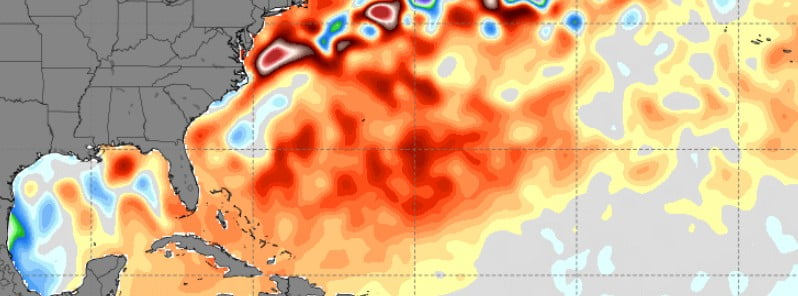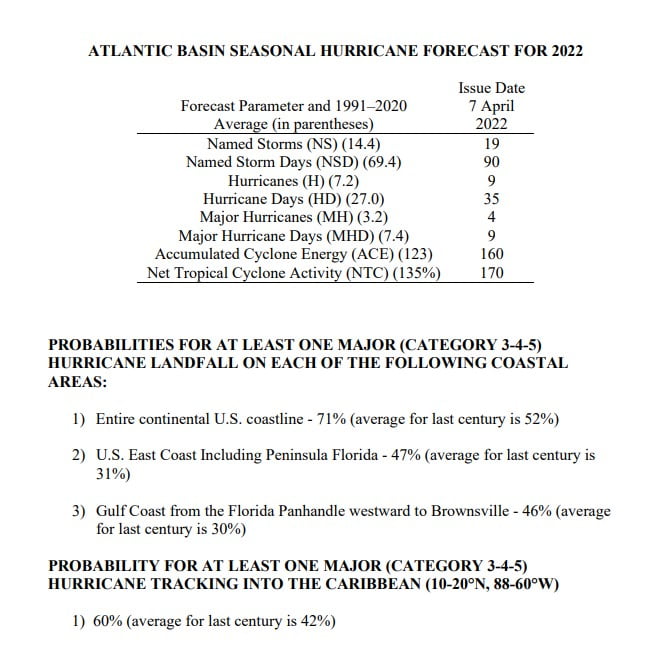The Atlantic seasonal hurricane forecast from Colorado State University calls for an above-average season

The Atlantic seasonal hurricane forecast from the Colorado State University (CSU) calls for an above-average season with 19 named storms, 9 hurricanes, and 4 major hurricanes. Reasons for the above-average forecast include a predicted lack of El Nino and warmer than normal subtropical Atlantic.
The Colorado State University forecast anticipates that the 2022 Atlantic basin hurricane season will have above-normal activity. Current weak La Niña conditions look fairly likely to transition to neutral ENSO by this summer/fall, but the odds of a significant El Niño seem unlikely.
Sea surface temperatures averaged across the eastern and central tropical Atlantic are currently near average, while the Caribbean and subtropical Atlantic sea surface temperatures are warmer than normal.
“We anticipate an above-average probability for major hurricanes making landfall along the continental United States coastline and in the Caribbean,” CSU meteorologists Philip Klotzbach and Michael Bell said.1
“As is the case with all hurricane seasons, coastal residents are reminded that it only takes one hurricane making landfall to make it an active season for them. They should prepare the same for every season, regardless of how much activity is predicted.”

“Information obtained through March 2022 indicates that the 2022 Atlantic hurricane season will have activity above the 1991–2020 average,” forecasters said.
“We estimate that 2022 will have 9 hurricanes (average is 7.2), 19 named storms (average is 14.4), 90 named storm days (average is 69.4), 35 hurricane days (average is 27.0), 4 major (Category 3-4-
5) hurricanes (average is 3.2) and 9 major hurricane days (average is 7.4).
The probability of U.S. major hurricane landfall is estimated to be about 135 percent of the long-period average.
CSU forecasters expect Atlantic basin Accumulated Cyclone Energy (ACE) and Net Tropical Cyclone (NTC) activity in 2022 to be approximately 130 percent of their long-term averages.
The forecast is based on an extended-range early April statistical prediction scheme that was developed using~40 years of past data. Analog predictors are also utilized.
“We are also including statistical/dynamical models based off of 25–40 years of past data from the European Centre for Medium Range Weather Forecasts, the UK Met Office and the Japan Meteorological Agency as three additional forecast guidance tools. Our statistical model, our statistical/dynamical models and our analog model all call for an active Atlantic hurricane season in 2022.”
The tropical Pacific is currently characterized by weak La Niña conditions.
“We believe that it is relatively likely that the tropical Pacific will revert to neutral ENSO conditions during this summer, but it seems unlikely that El Niño conditions will occur during this year’s hurricane season.”
El Niño typically reduces Atlantic hurricane activity through increases in vertical wind shear. The eastern and central tropical Atlantic currently have near-average sea surface temperatures, while the Caribbean and most of the subtropical Atlantic are warmer than normal.
The early April forecast is the earliest seasonal forecast issued by Colorado State University and has modest long-term skill when evaluated in hindcast mode. The skill of CSU’s forecast updates increases as the peak of the Atlantic hurricane season approaches.
This is the 39th year in which the CSU Tropical Meteorology Project has made forecasts of the upcoming season’s Atlantic basin hurricane activity.
Reference:
1 EXTENDED RANGE FORECAST OF ATLANTIC SEASONAL HURRICANE ACTIVITY AND LANDFALL STRIKE PROBABILITY FOR 2022 – April 7, 2022 – CSU
Featured image: Late March/early April 2022 SST anomaly pattern across the Atlantic Ocean. Credit: WeatherModels, CSU

Commenting rules and guidelines
We value the thoughts and opinions of our readers and welcome healthy discussions on our website. In order to maintain a respectful and positive community, we ask that all commenters follow these rules.